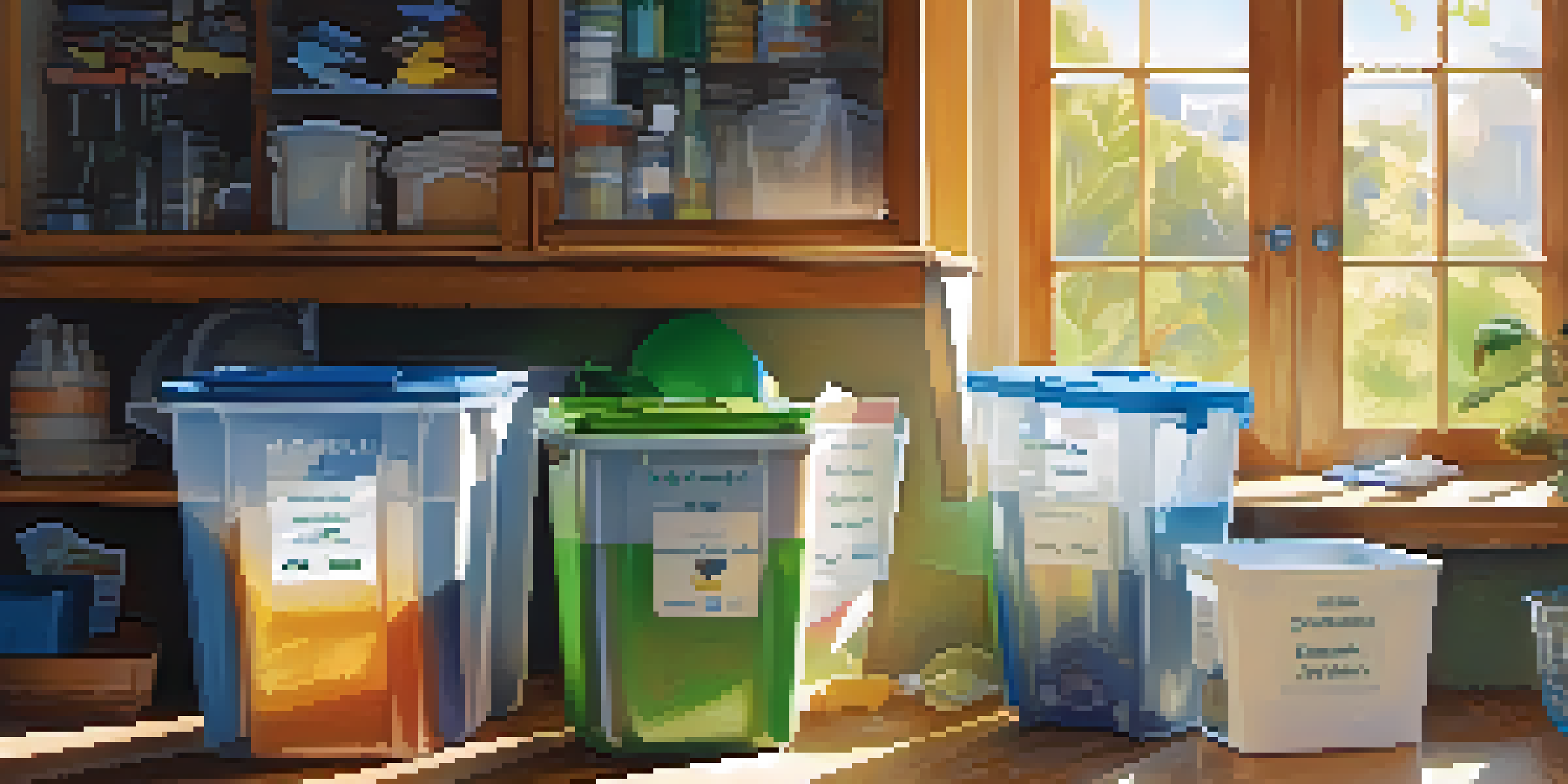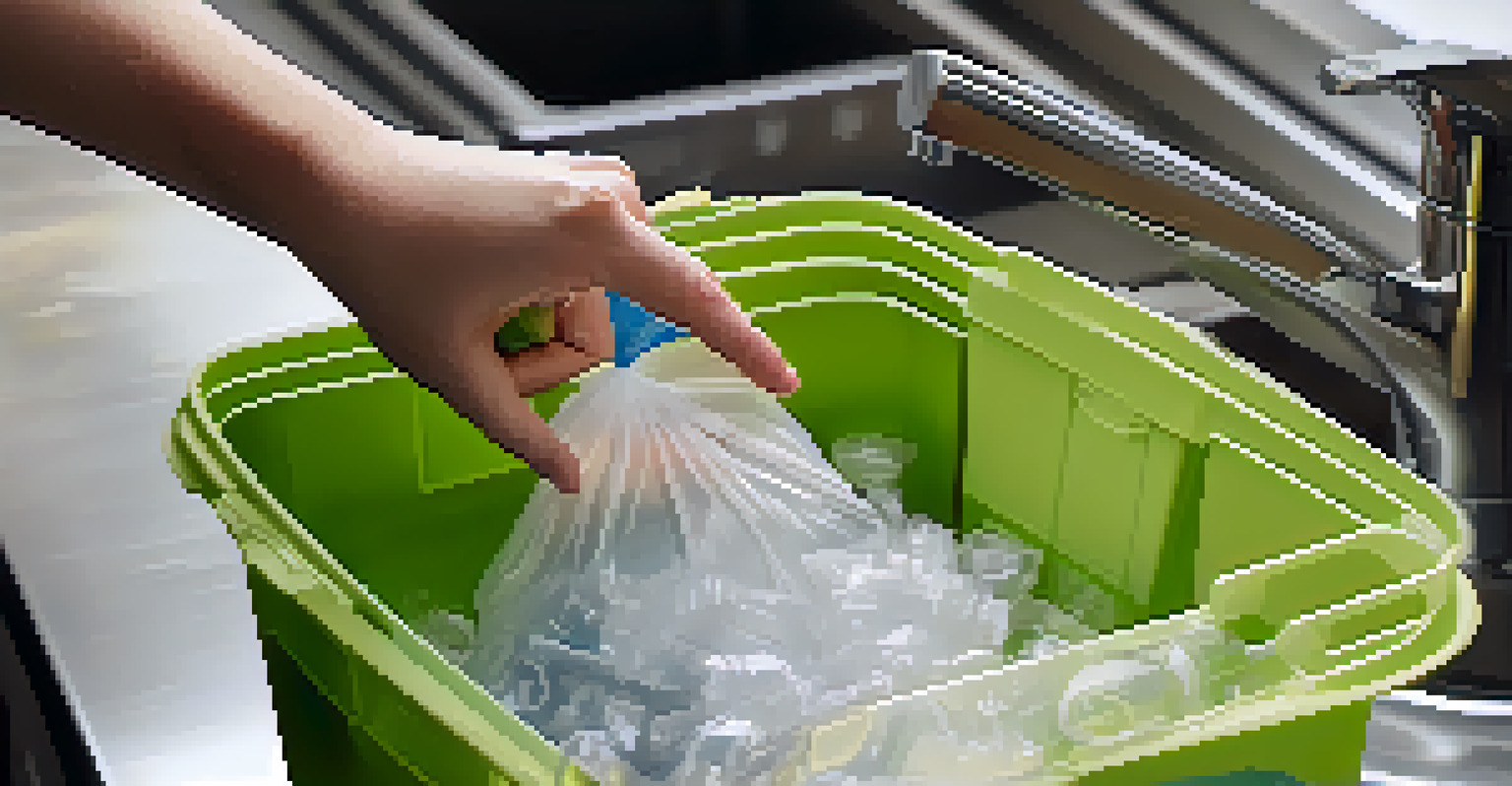The Importance of Recycling for a Healthier Planet

Recycling: A Simple Act with Profound Impact
Recycling is more than just tossing items into the blue bin; it’s a crucial step towards environmental conservation. By transforming waste into reusable materials, we reduce the need for raw resources, which helps preserve natural habitats. Imagine replacing a tree with a paper product; recycling paper means fewer trees cut down, leading to healthier forests.
The greatest threat to our planet is the belief that someone else will save it.
Furthermore, recycling curbs pollution by decreasing the emissions associated with producing new materials. For instance, manufacturing aluminum from recycled materials uses 95% less energy than from raw materials. That’s like saving enough energy to power a home for several months with just a single aluminum can!
Ultimately, each item you recycle contributes to a larger movement toward sustainability. It’s a reminder that every small effort counts, encouraging communities to adopt greener practices and fostering a culture of environmental responsibility.
The Environmental Benefits of Recycling
Recycling has a significant impact on reducing landfill waste, which is a growing concern globally. Landfills are not only unsightly; they emit harmful gases and leach toxic substances into the soil and water. By recycling, we divert materials from these sites, thus prolonging their lifespan and minimizing environmental harm.

Moreover, recycling conserves natural resources, which is essential for maintaining biodiversity. For example, recycling plastics helps reduce the demand for petroleum extraction, a process that can devastate marine and terrestrial ecosystems. Think of recycling as a protective shield for our planet's precious resources.
Recycling Conserves Resources
By recycling, we reduce the need for raw materials, helping to preserve natural habitats and conserve essential resources.
Additionally, by reducing the need for new materials, recycling lowers energy consumption. This decrease in energy usage translates to fewer greenhouse gas emissions, contributing to our fight against climate change. It’s a win-win situation for both the planet and future generations!
Economic Advantages of Recycling
Recycling not only benefits the environment, but it also has significant economic advantages. The recycling industry creates jobs, from collection and processing to manufacturing new products. In fact, for every job in the landfill sector, recycling creates approximately 1.17 jobs, boosting local economies.
We do not inherit the earth from our ancestors, we borrow it from our children.
Moreover, recycling can lead to cost savings for municipalities. By reducing the volume of waste sent to landfills, cities can save on disposal costs and redirect those funds into community services. Think of it as a way to stretch taxpayers’ dollars further while promoting sustainability.
Additionally, as demand for recycled materials grows, companies can capitalize on this trend, leading to increased profits. Businesses that adopt sustainable practices, including recycling, often attract eco-conscious consumers who prefer to support responsible brands. This creates a ripple effect that encourages more companies to follow suit.
The Role of Education in Recycling
Education plays a pivotal role in improving recycling rates. When communities are informed about what can and cannot be recycled, they are more likely to participate actively in recycling programs. Workshops, school programs, and community events can help demystify the recycling process and promote responsible behaviors.
Moreover, educating individuals about the environmental impact of their choices fosters a sense of responsibility. When people understand the benefits of recycling, they’re more likely to make it a habit. It’s like learning to ride a bike; once you grasp the concept, it becomes second nature.
Economic Benefits of Recycling
The recycling industry creates jobs and saves municipalities money by reducing waste disposal costs.
Incorporating recycling education into school curricula also prepares future generations to prioritize sustainability. By instilling these values early on, we can create a culture of environmental stewardship that carries into adulthood, ensuring a healthier planet for years to come.
Common Myths About Recycling
Despite its benefits, several myths about recycling persist. One common misconception is that recycling doesn’t significantly impact the environment. In reality, even small changes in recycling habits can lead to substantial improvements in resource conservation and pollution reduction.
Another myth is that all recyclables are equally valuable. In fact, contamination—such as food residue on containers—can hinder the recycling process. It’s essential to rinse containers before recycling, ensuring that materials are clean and ready for processing. Think of it as preparing an ingredient before cooking; the cleaner the ingredient, the better the outcome.
Lastly, some people believe that recycling is too inconvenient. However, with growing awareness and improved infrastructure, many communities now offer curbside recycling services, making it easier than ever to participate. Embracing recycling as part of our daily routine can be simple and rewarding.
How to Start Recycling Effectively
Getting started with recycling doesn’t have to be daunting. Begin by familiarizing yourself with your local recycling guidelines, as different areas have specific rules regarding what can be recycled. This ensures you’re making the most of your efforts without inadvertently contaminating the recycling stream.
Next, set up a designated recycling station in your home. Having separate bins for paper, plastics, metals, and glass makes it easier to sort items as you go. Consider labeling the bins to create a visual reminder, making recycling a more seamless part of your daily routine.
Education Enhances Recycling Efforts
Informing communities about recycling practices fosters responsible behaviors and encourages higher participation rates.
Lastly, stay committed and encourage others to join you! Share your recycling journey with friends and family, and inspire them to adopt similar practices. By creating a community of recyclers, we can amplify our efforts and create a more sustainable future together.
The Future of Recycling and Sustainability
Looking ahead, the future of recycling is intertwined with advancements in technology and policy. Innovations such as improved sorting systems and biodegradable materials are paving the way for more efficient recycling processes. These developments not only enhance recycling rates but also reduce the environmental impact of waste.
Additionally, governments and organizations are increasingly recognizing the importance of sustainable practices. Policies promoting circular economies—where resources are reused and recycled continuously—are gaining traction. This shift encourages businesses to rethink their production methods, leading to more sustainable solutions.

Ultimately, the future of recycling relies on collective action. By supporting sustainable initiatives and making conscious choices, we can foster a healthier planet for generations to come. It’s a shared responsibility, and together, we can create a brighter, greener future.